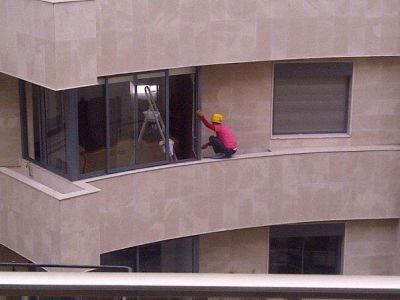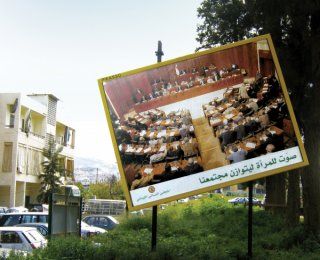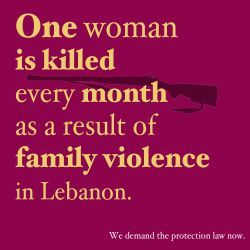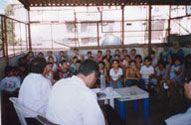
Publisher:
Bonnie King
CONTACT:
Newsroom@Salem-news.com
Advertising:
Adsales@Salem-news.com

~Truth~
~Justice~
~Peace~
TJP
Apr-08-2012 03:39

 TweetFollow @OregonNews
TweetFollow @OregonNews
Lebanon's Wretched Triad: Domestic Workers... Women... Palestinians
Dr. Franklin Lamb Salem-News.comAre they forging an alliance that will humanize Lebanon’s archaic laws?
Graphics by Alex
 Al-Manar |
(BEIRUT Al-Manar) - University students surveyed last month in Lebanon on the subject of how to improve their society and move it in the direction of meeting international human and civil rights norms identified three groups most in urgent need of immediate Lebanese governmental action.
Not surprising perhaps, but nevertheless refreshing, were the students strongly expressed convictions, regardless of particular sect, that those most victimized by Lebanon’s government and current laws are the roughly 200,000 migrant domestic workers, women, who make up half of Lebanon’s population, and the estimated 250,000 Palestinian refugees waiting to return to their country, Palestine.
The wretched domestic workers……..
 |
Last month’s suicide by domestic worker 33 years old Alem Dechasa-Desisa, following a beating in front of her Ethiopian Consulate by Ali Mahfouz and his colleague, whose recruitment agency arranged for Alem to work in Lebanon, was condemned across this country and angered those watching the video of the beating on LBCI TV.
- Dechasa claimed that a recruitment agent beat her and threatened to send her back to Ethiopia after she was dismissed by two employers.

This incident once more raised the near slavery plight of workers from Sri Lanka, Ethiopia, Sudan, the Philippines, and Nepal and elsewhere who are excluded from the Lebanon’s labor law. Among the triad of the most wretched in Lebanon, domestic workers suffer the most.
Once again, the Lebanese government issued a seemingly pro forma statement to say it would investigate the despicable abuse of domestic workers. Few here have confidence that anything will come of the current “investigation” any more than usually results from police or ministry investigations of domestic workers abuse.
"The Lebanese authorities only opened an investigation because they found themselves in the media spotlight," Nadim Houry, the deputy Middle East and North Africa director at Human Rights Watch, told a news conference, adding that "The government urgently needs to address the root causes that are driving so many migrant domestic workers to despair.”
More than a dozen Civil society groups also cited a culture of impunity when it comes to the abuse of domestic workers in Lebanon.
 |
In a 2008 study, Human Rights Watch found that there had been an average of one death a week from unnatural causes among domestic workers in Lebanon, including suicides and unexplained falls from tall buildings. Domestic workers are subject to restrictive immigration rules based on employer-specific sponsorship that puts workers at risk of exploitation and makes it extremely difficult for them to leave abusive employers, The Philippines, Ethiopia and other countries have banned their citizens from working in Lebanon due to the lack of protection from Lebanon yet many still come here in order to work and send money back home to their families.
According to HRW, the most common complaints documented by the embassies of labor-sending countries and civil society groups include mistreatment by recruiters, non-payment or delayed payment of wages, forced confinement to the workplace, a refusal to provide any time off for the worker, forced labor, and verbal and physical abuse. HRW also cited information prepared by KAFA Violence & Exploitation, a Lebanese women’s rights group, concerning nine suspicious deaths in August 2010.
A number of factors mean that MDWs often do not file or pursue complaints against their employers, but rather settle on unfavorable terms. These include lack of judicial support, fear of counter charges and being held in detention, and restrictive visa policies that make it hard for MDWs to see through cases that can take months or years to word through the protracted judicial process.
For many, the need to earn money to support their families, and the impulse of abused workers to return home quickly prompts them to withdraw their complaints rather than seek redress.
A Human Rights Watch review of 13 criminal cases that MDWs brought against employers found they took an average of 24 months to be resolved, while MDW complaints for unpaid wages filed in civil courts lasted between 21 and 54 months. Complaints brought before labor courts, which are supposedly faster than regular civil courts because their procedures are simpler, lasted 32 months on average.
The wretched Women of Lebanon-- half of the population…
 Lebanon’s Nationality Law Forbids Women From Passing |
Lebanese law prevents women married to a non-Lebanese from passing citizenship on to her children. Much like the right to property, which women in Lebanon, like Palestinians also don’t enjoy fully, the value of citizenship and family rights is meaningless when the state restricts transferability. This means that many children born and raised in Lebanon are required to regularly reapply for permits to continue living in the country.
Since Lebanese law does not provide a clear judicial standard children must deal with the administrative maze of Lebanon’s corrupt and notoriously inefficient bureaucracy. As the children grow into adults, they face restrictions on foreign labor, property ownership and a host of other implications much like Palestinian refugees. While diaspora Lebanese may have citizenship from other countries, they can also claim Lebanese citizenship via paternal consanguinity, but people born and raised in Lebanon depend on the arbitrary decisions of the security services.
 Women In Parliament: TILTED |
Women also remain invisible in positions of formal power such as Parliament. No women serve in Lebanon’s cabinet, while only four women – the usual group of wives, sisters and daughters – are Members of Parliament.
Some have proposed a quota for women in Parliament. According to lawyer Anthony Elghossain “in a political culture that derides women for being outspoken and active, a quota would amount to little more than a paper reform.

Indeed, without changing other aspects of Lebanese electoral law, a quota system would probably add a bunch of “yes women” to the flock of male sheep that is Lebanon’s legislature.”
The question of “marital rape” also continues to make a mockery of current Lebanese laws. Male rapists may rape at will since their crime is not defined as rape in the first place just so long as long as they are married to the woman they rape or if they subsequently propose marriage to their victims.
Nearly impossible as it is to believe, some in Lebanon’s Parliament such as Imad Hout told The Beirut Daily Star last month that “[t]here's nothing called rape between a husband and a wife,” but only the act of “forcing someone violently to have intercourse.”
Whenever Parliament finally agrees to consider changing domestic relations law, it always ends up postponing serious consideration or a vote on proposals with a press release saying in effect, “This subject requires more study. Legislative action deferred.”
Palestinians need for basic civil rights including the right to work and to own a home.
Elementary civil rights for Palestinian refugees must be respected. |
Due to an educational effort on the subject of civil rights for Palestinian refugees in Lebanon over the past few years, this issue is perhaps better known than the situation of domestic workers and women. But the urgent need to change Lebanese to grant Palestinians elementary civil rights is currently no closer to being achieved than are the above cases.
However, given the recent increase in activism among all three communities and their increasing inclination to collaborate, there is reason for some optimism for all three segments of Lebanese society which are organizing with international and increased domestic support.
 |
Currently the most dynamic action at organizing and working for change is coming from women in the Palestinian community. Long marginalized from key roles in the refugee camp “popular committees” Palestinian women in several of the 12 camps are challenging the male domination of the camps. This is particularly true in Bedawwi and Nahr al Bared camps in north Lebanon where Palestinian NGO’s such as Najdeh (“help”) are training and supporting women’s empowerment and urging them get involved in camp management since women best know the needs of the families and how to relate to them.
This dynamism is encouraging domestic workers to organize as well as offering support for women’s groups to demand their rights. The coming months may see more formal alliances among Lebanon’s most marginalized and wretched groups--domestic workers, women and Palestinian refugees. With growing civil society support for their efforts they may finally achieve the dismantling of archaic Lebanese laws and attitudes.
Special thanks to Al Manar and Uprooted Palestinians
 Dr. Franklin Lamb is Director of the Sabra Shatila Foundation. Contact him at: fplamb@sabrashatila.org. He is working with the Palestine Civil Rights Campaign in Lebanon on drafting legislation which, after 62 years, would, if adopted by Lebanon’s Cabinet and Parliament grant the right to work and to own a home to Lebanon’s Palestinian Refugees. One part of the PCRC legislative project is its online Petition which can be viewed and signed at: petitiononline.com/ssfpcrc/petition.html. Lamb is reachable at fplamb@palestinecivilrightscampaign.org.
Franklin Lamb’s book on the Sabra-Shatila Massacre, International Legal Responsibility for the Sabra-Shatila Massacre, now out of print, was published in 1983, following Janet’s death and was dedicated to Janet Lee Stevens. He was a witness before the Israeli Kahan Commission Inquiry, held at Hebrew University in Jerusalem in January 1983.
Dr. Franklin Lamb is Director of the Sabra Shatila Foundation. Contact him at: fplamb@sabrashatila.org. He is working with the Palestine Civil Rights Campaign in Lebanon on drafting legislation which, after 62 years, would, if adopted by Lebanon’s Cabinet and Parliament grant the right to work and to own a home to Lebanon’s Palestinian Refugees. One part of the PCRC legislative project is its online Petition which can be viewed and signed at: petitiononline.com/ssfpcrc/petition.html. Lamb is reachable at fplamb@palestinecivilrightscampaign.org.
Franklin Lamb’s book on the Sabra-Shatila Massacre, International Legal Responsibility for the Sabra-Shatila Massacre, now out of print, was published in 1983, following Janet’s death and was dedicated to Janet Lee Stevens. He was a witness before the Israeli Kahan Commission Inquiry, held at Hebrew University in Jerusalem in January 1983.
 |
 |
 |
 |
 |
 |
Articles for April 7, 2012 | Articles for April 8, 2012 | Articles for April 9, 2012

Quick Links
DINING
Willamette UniversityGoudy Commons Cafe
Dine on the Queen
Willamette Queen Sternwheeler
MUST SEE SALEM
Oregon Capitol ToursCapitol History Gateway
Willamette River Ride
Willamette Queen Sternwheeler
Historic Home Tours:
Deepwood Museum
The Bush House
Gaiety Hollow Garden
AUCTIONS - APPRAISALS
Auction Masters & AppraisalsCONSTRUCTION SERVICES
Roofing and ContractingSheridan, Ore.
ONLINE SHOPPING
Special Occasion DressesAdvertise with Salem-News
Contact:AdSales@Salem-News.com

googlec507860f6901db00.html


Terms of Service | Privacy Policy
All comments and messages are approved by people and self promotional links or unacceptable comments are denied.
[Return to Top]
©2026 Salem-News.com. All opinions expressed in this article are those of the author and do not necessarily reflect those of Salem-News.com.